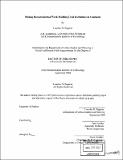| dc.contributor.advisor | Paul Smoke. | en_US |
| dc.contributor.author | Pagaran, Lourdes N. (Lourdes Navaro), 1957- | en_US |
| dc.contributor.other | Massachusetts Institute of Technology. Dept. of Urban Studies and Planning. | en_US |
| dc.coverage.spatial | a-cb--- | en_US |
| dc.date.accessioned | 2005-08-23T18:41:36Z | |
| dc.date.available | 2005-08-23T18:41:36Z | |
| dc.date.issued | 2000 | en_US |
| dc.identifier.uri | http://hdl.handle.net/1721.1/8258 | |
| dc.description | Thesis (Ph. D.)--Massachusetts Institute of Technology, Dept. of Urban Studies and Planning, 2000. | en_US |
| dc.description | "September 2001." | en_US |
| dc.description | Includes bibliographical references (leaves 212-217). | en_US |
| dc.description.abstract | This dissertation examines the dynamics of decentralization in a highly centralized, institutionally constrained, and externally resource-dependent environment. It uses a case study of Seila, a decentralization program in Cambodia, based on extensive fieldwork from 1996 to 1999. Initiated in 1996 by UNDP, the Seila program took a different path from other rural development programs by working through established provincial and local development structures on a pilot basis in five Cambodian provinces. It provided grants to target communes and selected sector along with the introduction of decentralized systems and mechanisms and the provision of capacity building at provincial and local levels. The findings of this study suggest that the Seila program has been able to establish decentralized systems and mechanisms to deliver local services and to influence macro level policy reforms on decentralization in three ways: by a delicate balancing act between process and output, by developing capacity and institutional networking at various levels, and by gaining support of various key institutional actors including provincial and local authorities, central government, donor agencies, and NGOs. The literature on fiscal federalism and on participatory and governance focuses on the primacy of either process or output. Contrary to these views, the close links between process and output have encouraged local communities to undertake collective action and have engendered accountability and responsiveness from provincial and local authorities. | en_US |
| dc.description.abstract | (cont.) By building capacity and developing strategic partnerships, both at horizontal and vertical structures, provincial and local development committees have effectively managed local demand. Thus, these findings confirm the emerging literature on decentralization that developing effective local governments requires wholesale capacity building and establishing a broad spectrum of support networks. The support from key institutional actors, which enabled the Seila program to sustain its field-level initiatives and to buttress them through institutional and policy backing from central government, suggests that decentralization is indeed both a political decision and outcome of consensus building among politicians and decision makers. | en_US |
| dc.description.statementofresponsibility | by Lourdes N. Pagaran. | en_US |
| dc.format.extent | 217 leaves | en_US |
| dc.format.extent | 16708414 bytes | |
| dc.format.extent | 16708174 bytes | |
| dc.format.mimetype | application/pdf | |
| dc.format.mimetype | application/pdf | |
| dc.language.iso | eng | en_US |
| dc.publisher | Massachusetts Institute of Technology | en_US |
| dc.rights | M.I.T. theses are protected by copyright. They may be viewed from this source for any purpose, but reproduction or distribution in any format is prohibited without written permission. See provided URL for inquiries about permission. | en_US |
| dc.rights.uri | http://dspace.mit.edu/handle/1721.1/7582 | |
| dc.subject | Urban Studies and Planning. | en_US |
| dc.title | Making decentralization work : building local institutions in Cambodia | en_US |
| dc.type | Thesis | en_US |
| dc.description.degree | Ph.D. | en_US |
| dc.contributor.department | Massachusetts Institute of Technology. Department of Urban Studies and Planning | |
| dc.identifier.oclc | 50324896 | en_US |
